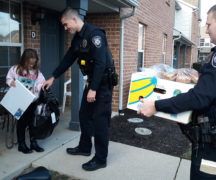I enjoyed your June 13, 2020 article “BGPD trains to use least force necessary – plus tracks who it is used on.” I was happy to read that BGPD already meets most of the “8 Can’t Wait” policies around officer use of force. They also recognize the importance of recruiting officers of color. But, I have some questions about the race-specific stop, arrest, and use-of-force numbers presented. Bowling Green Police Major Justin White states, “There is no indication that we stop someone by their race disproportionately.” But, the numbers provided suggest that black people are disproportionately stopped, arrested, and subjected to additional force.
The article states that the population served by BGPD is about 88% White, 6% Black, and 6% Latino. But, the numbers for 2018 provided show that Black people comprised 20.3% of arrests (259 arrests out of a total of 1278). White people experienced 1002 arrests or 78.4% of arrests. That means that Black people were arrested 3.4 times more than there representation in the community. Similarly, if you look at the use of force, there were 39 incidents, involving 26 White, 11 Black, and 2 Latino/other people. That means that Black people experienced 28.2% of use-of-force incidents. If we assume that use-of-force only happens in the context of an arrest, that means that 4.2% of Black arrests (11 out of 259) involved force, but only 2.6% of White arrests (26 out of 1002) involved use of force. Traffic warnings and citations were also racially disproportionate. Black people represented about twice the share of warnings and citations as their representation in the local population.
There could be reasonable explanations besides racial bias to explain these disparities. For example, I would guess that the average age of Black people living in Bowling Green is younger than the average age of White people living in BG. And, we know that young people are more likely to engage in criminal behavior than older people. But, the racial disparities in police activity need to be explained to determine whether they reflect bias or responses to offending.
I look forward to more information from BGPD and the broader community to make Bowling Green a more supportive place for people of all racial and ethnic backgrounds.
Steve Demuth
Bowling Green



